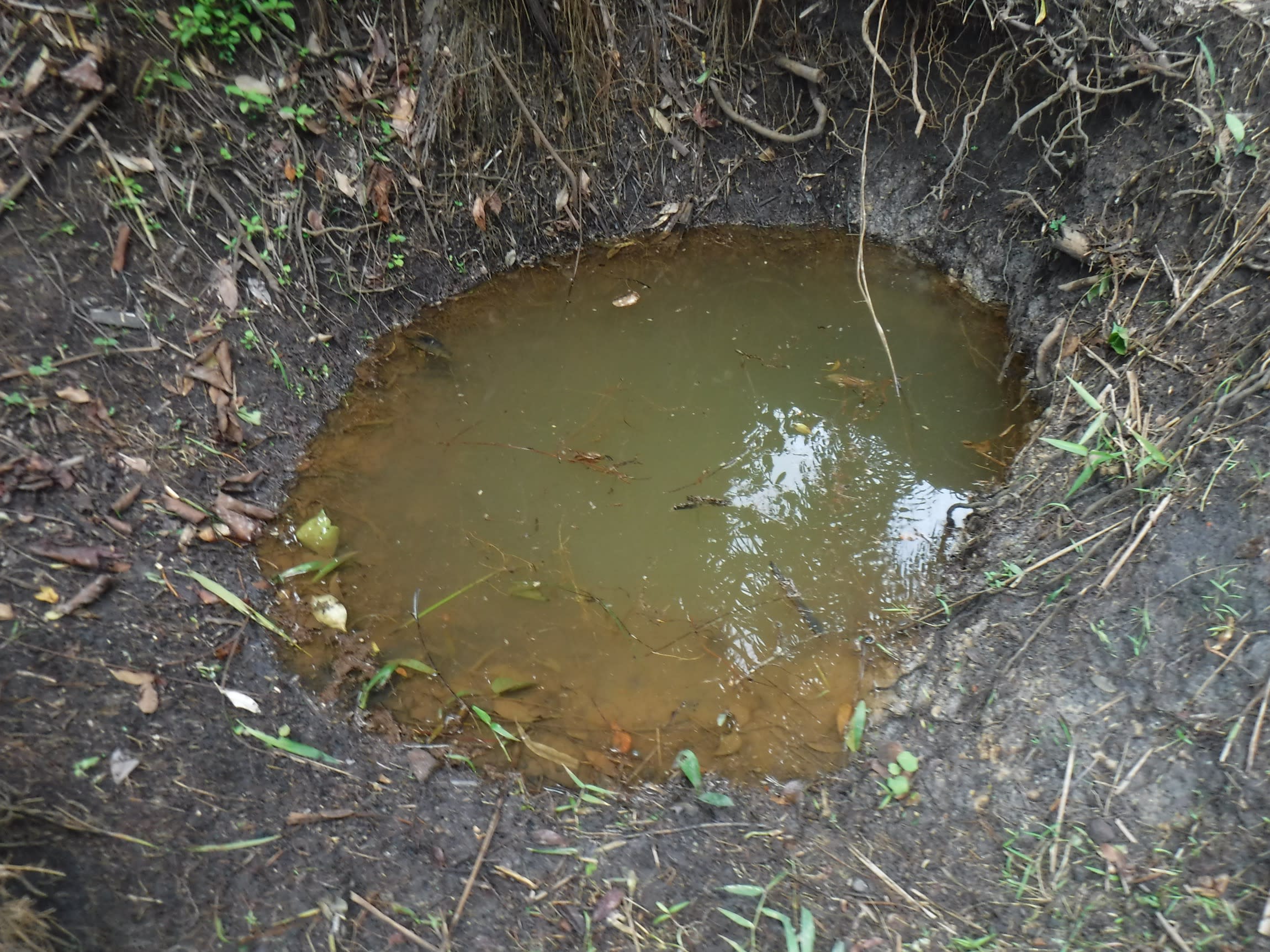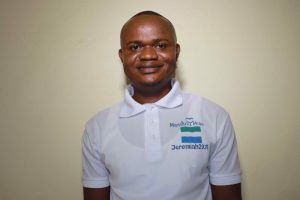December, 2022: Mabendo Community Borehole Well Complete!
We are excited to share that there is now a safe, reliable borehole well in Mabendo Community. As a result, community members no longer rely on unsafe water to meet their daily needs. We also conducted hygiene and sanitation training, which focused on healthy practices such as handwashing and using latrines.
"I was not happy to fetch water from the stream," said 13-year-old Isatu C. "It was not easy to fetch water from the stream because the road is bushy. It is hard and painful to carry a bucket of water from the swamp to my house. I am happy because of the new water well that is now in the village. It is near to my house. There is enough water from the pump, and it is clean water to drink. I [won't] go the stream anymore to fetch water."

Isatu collecting water at the new well.
"It is good now that I have a water well close to my house where I can easily fetch water to drink and to do all the work at home," Isatu continued. "It is now easy for [me] to fetch water from the well to do the morning activities at home before going to school on time."
"I used to fetch water from the stream," said 51-year-old farmer Ya Bundu Kanu. "It is a long distance from my house. The water changes color, and it would be difficult to drink. Sometimes, the stream water becomes salty. It was difficult to drink the water because of the salt taste. This caused me to drink less water for a day.

Ya Bundu pours water at the new well.
"Today, I am happy because of this new water well in this community," Ya Bandu continued. "It is an immense help to me because I [won't] fetch water from the stream again. The water is exceptionally clean and has no salt taste. I can now drink enough water from this water well at any time. I thank you all for providing us this water well.
"It was not easy for me to work [an] entire day on my farm and return to the house before going to fetch water from the stream to prepare food for my family. I got tired, but I had no option because I needed enough [water] to use at my house after I had returned from my farm. The means of fetching water from the stream was incredibly challenging for me.

Pumping water at the new well.
"Every day was a busy day for me in this community because I had activities to complete before the end of the day. The completion of certain activities was not possible because of the shortage in water at my house to use. I now have less workload for a day because I [won't] spend more time on fetching water from a long distance to my house."

We held a dedication ceremony to officially hand over the well to the community members. Several local dignitaries attended the ceremony, including representatives from the Port Loko District Council, the Ministry of Water Resources, and the Ward Council. Each official gave a short speech thanking everyone who contributed to this water project and reminding the community members to take good care of it. Then, Isatu and Ya Bundu made statements on their community's behalf. The ceremony concluded with celebration, singing, and dancing.
New Well
The drill team arrived the day before beginning work. They set up camp and unpacked all their tools and supplies to prepare for drilling the next day. The community provided space for the team to store their belongings and meals for the duration of their stay. The following day, work began.

Our team dug two pits next to the drill rig, one for the drill’s water supply and another for what the drill pulls out of the borehole. In some cases, we order a private supplier to deliver the water for drilling since water access is already challenging.
Day one of drilling began as the team mixed water with bentonite, an absorbent clay, in the two dug pits. Next, the team fixed a four-inch carbide-tipped bit to the five-foot-long drill stem. They started the mud pump to supply water to the drill rig so that drilling could begin!

After putting each five-foot length of drill stem into the hole, the team took material samples. We labeled the bags to review them later and determine the aquifer locations.
On the second day of drilling, the team expanded the hole and cleared it of mud. After reaching a total depth of 16 meters, the team forcefully pumped clean water into the well to remove any dirt and debris from the drilling process. We then protected the screened pipe by adding a filter pack. The team hoisted the temporary drilling casing to fortify the pipes with cement.

Bailing.
Next, we bailed the well by hand for three days before conducting a yield test to verify the water quantity. This well has a static water level of seven meters. With these excellent results, we installed a stainless steel pump. Water quality test results showed that this was clean water fit for drinking!

New Knowledge
Before conducting any hygiene training, we called and visited the local water user committee to understand the community’s challenges and lack of sanitation facilities. We shared the findings from our discussions with the committee members to help them make the necessary adjustments before the training began. For example, we identified households without handwashing stations or ones that may need to repair their latrines. With this information, community members worked together to improve hygiene and sanitation at home.
After this preparatory period, we scheduled a time when members from each household using the water point could attend a three-day hygiene and sanitation training. We then dispatched our teams to the agreed-upon location to hold the meeting.

Training topics covered included handwashing and tippy taps, good and bad hygiene habits, disease transmission and prevention, COVID-19, worms and parasites, proper dental hygiene, proper care of the well's pump, keeping the water clean, the cost recovery system, the importance of using dish racks and clotheslines, the importance of toilets, keeping latrines clean, balanced diets, the diarrhea doll, and HIV and AIDS.
One of the most impactful training topics was malaria, which has affected a lot of people in Mabendo. A local nurse whom we invited to attend asked the training participants about their understanding of malaria, and one woman shared a personal story. Her son was sick, but she preferred taking him to the local herbalist for treatment. However, after a few days of giving him herbs, he wasn't getting better. Her sister came for a visit, who admonished her for not taking him to a hospital sooner.

Demonstrating how to use a mosquito net.
When they got to the hospital, her son was diagnosed with malaria and given treatment that helped him quickly. She told the training participants what the doctors told her: that they should all sleep under a mosquito net and they should visit a clinic or hospital rather than an herbalist at the first sign of illness. Her fellow participants applauded her story as thanks for sharing it.
Another helpful topic was water contamination. One of the training facilitators showed participants a poster of a woman drinking water from a stream next to a wild animal doing the same thing. Some of the community members were surprised to learn that sharing a source of water with wildlife, which is also open to other environmental contaminants, was likely the cause of many of the community's past illnesses.

"They were happy for the training because they now know about the causes of sicknesses in their community," said our field officer, Phillip. "They promised to change their mindset about not taking safe care of the water source and not cleaning the environment. They continued talking about the topic, even as they were returning to their various houses after the training. The looks on their faces [showed] that they are ready for the change they had promised in their community."
"This training is valuable to me because of the knowledge that I gained about preventing myself from getting sick," said 40-year-old Isatu Bangura, who will serve as the well's caretaker.

Isatu on the day of the training.
"I cannot allow my compound to be untidy," Isatu continued. "I will also rush to the nearest health center anytime I get sick, or my family member gets sick. I now know the importance of having latrines in my community, and the importance of cleaning my teeth two times a day. The training urged me to change from all my bad hygiene practices. [This] will prevent me from [becoming] sick. I want to thank the organization for the hygiene training because it is a blessing for me to change my mindset from all the bad hygiene practices to good hygiene practices in this community."
Conclusion
This project required a substantial collaboration between our staff, our in-country teams, and the community members themselves. When an issue arises concerning the well, community members are equipped with the necessary skills to rectify the problem and ensure the water point works appropriately. However, if the issue is beyond their capabilities, they can contact their local field officers to assist them.
Also, we will continue to offer them unmatchable support as a part of our monitoring and maintenance program. We walk with each community, problem-solving together when they face challenges with functionality, seasonality, or water quality. Together, all these components help us strive for enduring access to reliable, clean, and safe water for this community.
With your contribution, one more piece has been added to a large puzzle of water projects. In our target areas, we’re working toward complete coverage of reliable, maintained water sources within a 30-minute round trip for each community, household, school, and health center. With this in mind, search through our upcoming projects to see which community you can help next!
Thank you for making all of this possible!




 Borehole Well and Hand Pump
Borehole Well and Hand Pump
 Rehabilitation Project
Rehabilitation Project

































